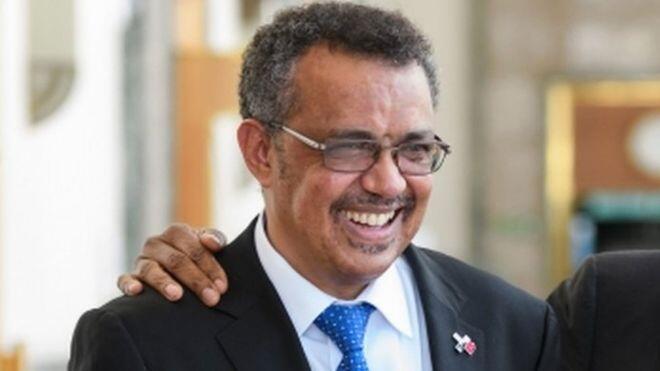Tedros Adhanom Ghebreyesus from Ethiopia will be the next director general of the World Health Organization (WHO).
He will be the first African to head up the UN agency, after winning the most votes from 186 member states.
He replaces Margaret Chan, who will step down from her 10-year post at the end of June.
During her tenure, the WHO’s response to the Ebola epidemic in West Africa was criticised for being too slow.
The agency was accused of missing key warning signs about the severity of the outbreak that began in December 2013 and ultimately killed more than 11,000 people.
Addressing the World Health Assembly shortly before the vote, Dr Tedros promised to respond to future emergencies “rapidly and effectively”.
He also promised to stand up for the rights of the poor.
“All roads should lead to universal health coverage. I will not rest until we have met this.”
Who is Dr Tedros?
Age: 52
Family life: Married, with five children and lives in Ethiopia
Previous jobs: Ethiopian minister of health and foreign affairs, chairman of the board of the Global Fund to Fight Aids, TB and Malaria
Qualifications: Internationally recognised malaria researcher, with a PhD in community health
His election was not without controversy.
He has recently been accused of covering up three cholera epidemics in Ethiopia, but his supports say this is untrue.
Ethiopian opposition groups are also critical of Dr Tedros. They accuse the government of human rights abuses and believe that Dr Tedros’ candidacy is an attempt to raise the country’s diplomatic profile.
Dr Tedros said his vision as the new director general was of “a world in which everyone can lead health and productive lives, regardless of who they are or where they live”.
He told delegates at the World General Assembly: “I promise I will get up every day, determined to make a difference… I am ready to serve.”
His top five priorities in his new job are:
- Advancing universal health coverage
- Ensuring WHO responds rapidly and effectively to disease outbreaks and emergencies
- Putting the wellbeing of women, children and adolescents at the centre of global health and development
- Helping nations address the effects of climate change on health
- Making the agency transparent and accountable
Analysis By Tulip Mazumdar, global health correspondent
Although some people see Dr Tedros as a controversial pick, many others point to his impressive CV and track record, and insist he is the best person to lead the world’s “guardian of global health”.
As well as serving as Ethiopia’s foreign affairs and health ministers, he’s also chaired the Global Fund, which mobilizes and invests about $4bn a year to fight Aids, tuberculosis and malaria.
During the election campaign, Dr Tedros told me about the deep injustice he felt as a child when his five-year-old brother died of what he now believes was measles. He said the disparity of care between the developed and developing world continues to be utterly unacceptable.
Dr Tedros says universal healthcare – where everyone has access to affordable care when and where they need it – will be central to his presidency.
This is indeed the holy grail of global health, and Dr Tedros is now the man in charge of pressing governments to make it happen.











